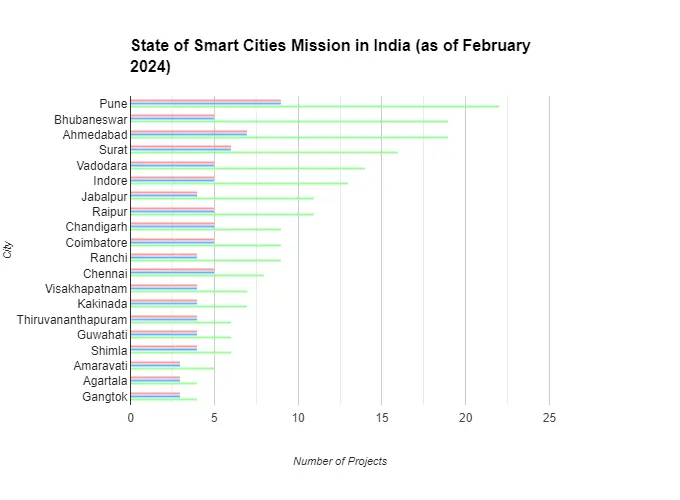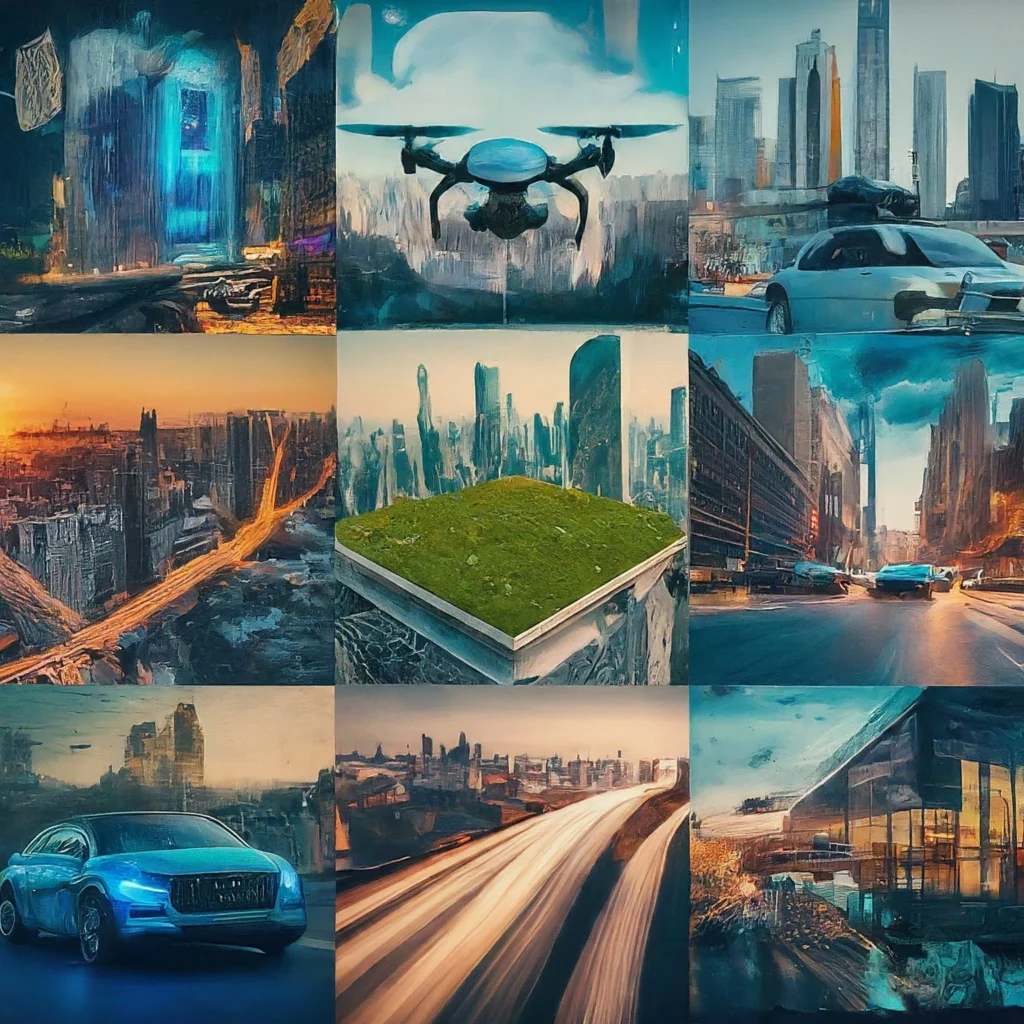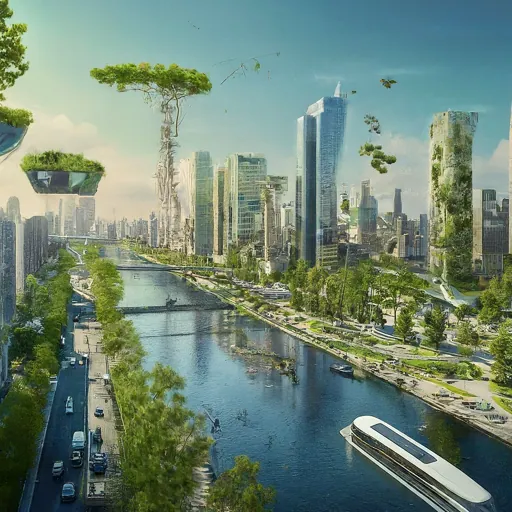Table of Contents
ToggleExplore how technology and architecture are shaping the cities of the future
Introduction
1. Definition and Evolution of Smart Cities
The future of smart cities represent a transformative paradigm in urban development, seamlessly amalgamating cutting-edge technology for intelligent, sustainable living. Originally centered on technological integration, their evolution now emphasizes not only efficiency but also ecological consciousness, marking a profound shift in urban planning philosophies.
2. Significance of
The Future of Smart Citiesin India’s Development
In the expansive canvas of India’s developmental landscape, smart cities emerge as potent catalysts for innovation, economic growth, and a markedly elevated quality of life. The overarching significance lies not merely in technological advancement but in the comprehensive commitment to fostering a resilient, technologically advanced, and environmentally responsible urban landscape. This nuanced approach contributes substantially to the nation’s multifaceted progress.
The Future of Smart Cities
Components of Smart Cities

1. Infrastructure Development
Infrastructure development serves as the backbone of smart cities, encompassing advanced transportation systems and modern utilities. This robust foundation is imperative for the seamless integration of smart technologies, ensuring the overall efficiency and functionality of urban living.
2. IOT Integration
The heartbeat of smart cities, the Internet of Things (IoT), transforms urban landscapes into intelligent ecosystems. Through interconnected devices, cities optimize resource utilization, enhance efficiency, and elevate the overall quality of life for residents.
3. Sustainable Energy Solutions
Prioritizing sustainability, smart cities integrate renewable energy sources to minimize environmental impact. This commitment to eco-friendly practices establishes a foundation for creating resilient, environmentally conscious urban environments.
State of The Future of Smart Cities

1. Case Studies and Success Stories
Examining the current state of The Future of Smart Cities unveils inspiring case studies and success stories. These real-world examples highlight the positive impact of smart city implementations, showcasing tangible benefits experienced by communities and residents.
2. Challenges and Obstacles
Despite progress, smart city initiatives in India encounter challenges and obstacles. Addressing these hurdles, whether technological, financial, or social, is crucial for overcoming impediments and ensuring the sustained success of urban development.
1. Smart City Mission
At the forefront of smart city development in India is the ambitious Smart City Mission. Delving into the mission unveils the government’s strategic initiatives aimed at driving comprehensive urban development and transformation.
2. Funding and Support Programs
Financial backing is pivotal for the realization of smart city projects. Exploring funding mechanisms and support programs sheds light on the collaborative efforts between the government and private sectors, laying the groundwork for sustainable urban development.
Technology Innovations in Smart Cities

1. Artificial Intelligence in Urban Planning
Artificial Intelligence (AI) emerges as a transformative force in urban planning within smart cities. Exploring its applications unveils a landscape where AI optimizes resource allocation, enhances efficiency, and shapes the very fabric of intelligent urban development.
2. Blockchain for Security and Efficiency
Blockchain technology takes center stage, providing a robust foundation for security and efficiency within smart cities. Its decentralized nature ensures secure transactions and data integrity, contributing to a trustworthy and resilient urban environment.
3. Data Analytics for Smart Decision-Making
The utilization of data analytics becomes paramount for informed decision-making in smart city management. This section explores how harnessing the power of data ensures evidence-based strategies, adapting urban development to the dynamic needs of the community.
Environmental Impact and Sustainability

1. Green Initiatives
Smart cities lead the charge in implementing eco-friendly practices. From expansive green spaces to sustainable architecture, these green initiatives play a pivotal role in creating a healthier urban environment and fostering a higher quality of life for residents.
2. Waste Management and Circular Economy
Effective waste management and a commitment to the circular economy are vital components of smart city sustainability. This section explores how minimizing waste and adopting circular economy principles contribute to creating environmentally conscious and sustainable urban lifestyles.
Social and Economic Implications

1. Impact on Quality of Life
The Future of Smart Cities redefine urban living, significantly impacting the quality of life for residents. Improved services, enhanced connectivity, and an emphasis on well-being mark the tangible outcomes of intelligent urban planning, elevating the overall living experience.
2. Job Creation and Economic Growth
A driving force behind smart cities is their contribution to economic growth through job creation. The interconnected infrastructure and technological advancements foster a thriving urban economy, benefiting both residents and businesses alike.
Public-Private Partnerships

1. Collaboration Models
Effective smart city development often hinges on successful collaboration models between the public and private sectors. This section delves into the various models employed, showcasing the synergy that arises from cooperative efforts in driving urban innovation.
2. Success Stories
Highlighting successful public-private partnerships, this segment explores real-world examples that illustrate how joint efforts contribute significantly to the success of Smart Cities initiatives. These success stories serve as beacons, showcasing the potential of collaborative approaches in shaping the urban landscape.
Connectivity and Digital Inclusion

1. 5G Technology Integration
The integration of 5G technology stands as a cornerstone for smart cities. This section explores how the seamless integration of 5G enhances connectivity, laying the foundation for a digitally advanced and interconnected urban landscape.
2. Bridging the Digital Divide
Efforts to bridge the digital divide are pivotal in The Future of Smart Cities initiatives. This segment discusses strategies aimed at ensuring that all residents, regardless of socio-economic backgrounds, have equitable access to the benefits of smart city technologies.
Urban Mobility and Transportation

1. Smart Transportation Systems
Advancements in smart transportation systems redefine urban mobility. From intelligent traffic management to sustainable transportation options, this section explores innovative solutions that contribute to reduced congestion and enhanced efficiency in urban mobility.
2. Reducing Traffic Congestion
Addressing the challenge of traffic congestion, specific strategies, and technologies are highlighted in this segment. By employing smart solutions, cities can effectively mitigate congestion, creating more accessible and efficient transportation networks.
Healthcare and Education in Smart Cities

1. Technological Advancements
Technological advancements play a transformative role in shaping healthcare and education within smart cities. This section explores cutting-edge technologies that enhance medical and educational services, contributing to a progressive and efficient urban ecosystem.
2. Accessible Healthcare and Education
Ensuring accessible healthcare and education is fundamental to The Future of Smart Cities initiatives. This segment delves into strategies and innovations aimed at providing inclusive and high-quality healthcare and education services for all residents.
Cultural and Heritage Preservation

1. Balancing Modernization with Heritage Conservation
The future of smart cities aim for a delicate balance, preserving cultural and heritage sites while embracing modernization. This section explores strategies that harmonize technological advancements with the conservation of cultural and historical treasures, ensuring a city’s unique identity endures.
2. Smart Solutions for Cultural Spaces
Innovative solutions integrate technology seamlessly with cultural spaces. From interactive exhibits to digital preservation, this segment explores how the future of smart cities solutions enhance the cultural experience, promoting accessibility and preservation of cultural heritage in urban environments.
Cybersecurity in The Future of Smart Cities

1. Ensuring Data Privacy
In the interconnected landscape of smart cities, ensuring robust data privacy is paramount. This section delves into the measures implemented to safeguard residents’ sensitive information, maintaining trust in the secure management of data within urban environments.
2. Securing Critical Infrastructure
Protecting critical infrastructure is a top priority in The Future of Smart Cities cybersecurity. This segment explores the strategies and technologies employed to safeguard vital systems, ensuring resilience against cyber threats and maintaining uninterrupted urban functionality.
Future Trends and Innovations

1. Emerging Technologies
Exploring the horizon of smart cities reveals emerging technologies poised to redefine urban living. This section delves into cutting-edge innovations, from AI advancements to sustainable solutions, that will shape the future landscape of intelligent and progressive urban environments.
2. Anticipated Developments in Smart Cities
Looking ahead, this segment discusses anticipated developments that promise to further enhance the intelligence and functionality of the future of smart cities. From advanced connectivity solutions to sustainable practices, these anticipated trends signify the continual evolution of urban innovation.
Stakeholder Engagement and Community Involvement

1. Participatory Urban Planning
Smart cities emphasize the importance of involving communities in the urban planning process. This section explores the concept of participatory urban planning, where residents actively contribute to decision-making, ensuring a more inclusive and community-centric approach to city development.
2. Building Community Resilience
Strategies for building community resilience are vital in the future of smart cities development. This segment discusses initiatives aimed at empowering communities to actively engage in the development and maintenance of the future of smart cities, fostering a sense of ownership and pride among residents.
Financing the Future

1. Sustainable Financial Models
Smart city development hinges on sustainable financial models. This section explores the various financial frameworks that ensure the long-term viability and success of the future of smart cities projects, providing a stable foundation for ongoing innovation and growth.
2. Attracting Investments
Strategies for attracting investments are crucial in fueling the future of smart cities. From public-private partnerships to innovative funding approaches, this segment delves into how cities can attract investments that drive continuous development, ensuring a dynamic and prosperous urban future.
Regulatory Framework and Compliance

1. Addressing Legal and Regulatory Challenges
Navigating the complex landscape of legal and regulatory challenges is crucial for the future of smart cities initiatives. This section examines strategies and frameworks aimed at addressing these challenges, ensuring compliance and fostering a legally sound environment for urban development.
2. Ensuring Ethical Practices
Ethical practices are foundational in the development and governance of the future of smart cities. This segment delves into the importance of maintaining transparency and accountability, ensuring that ethical standards are upheld in all aspects of urban management and innovation.
Monitoring and Evaluation

1. Key Performance Indicators
Effectively monitoring the future of smart cities projects involves identifying and utilizing key performance indicators (KPIs). This section explores the crucial metrics that gauge the success and impact of initiatives, providing a comprehensive evaluation framework for continuous improvement.
2. Continuous Improvement Strategies
Continuous improvement is integral to the evolution of the future of smart cities. This segment discusses strategies for ongoing refinement based on monitoring and evaluation, ensuring that cities adapt and innovate to meet the dynamic needs of their residents and the urban environment.
FAQs
A. Common Questions About Smart Cities in India
A smart city in India integrates technology for efficient urban living, prioritizing sustainability and innovation to enhance overall quality of life.
Funding comes from a mix of government allocations, private investments, and public-private partnerships, ensuring a collaborative and sustainable approach.
Community engagement is integral, with residents actively participating in decision-making processes to ensure inclusivity and a community-centric approach.
Smart cities implement green initiatives, sustainable energy solutions, and efficient waste management practices to minimize environmental impact.
Smart cities enhance residents’ lives through improved services, efficient transportation, and advanced technologies. From reduced traffic congestion to better healthcare access, these innovations collectively contribute to a higher quality of life for urban dwellers.
B. Expert Insights and Responses
- Expert Response: Balancing modernization with heritage conservation requires innovative urban planning, incorporating technologies that preserve cultural identity while embracing progress.
Expert Response: AI will play a pivotal role, in optimizing urban planning, and resource allocation, and enhancing overall efficiency, ensuring cities are adaptive and intelligent.
Expert Response: Robust encryption, stringent data governance policies, and regular cybersecurity audits are crucial to maintaining data privacy and securing critical infrastructure.
Expert Response: Public-private partnerships are vital for funding, expertise, and collaborative innovation, driving the success of smart city initiatives and ensuring sustainable urban development.
Expert Response: Implementing 5G in smart cities faces challenges such as infrastructure deployment, spectrum allocation, and addressing concerns about potential health effects. Collaborative efforts among stakeholders are crucial to overcoming these challenges for widespread 5G integration.







Leave a Reply